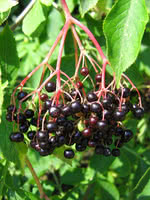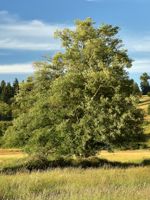Mon-Fri 9am - 5pm Mountain time
Black Elderberry vs Red Alder
Sambucus canadensis
Alnus rubra
NOT AVAILABLE THIS SEASON - MIGHT RETURN
CUSTOM GROW
Black Elderberry is a deciduous shrub native to eastern North America. You can plant this shrub in moist areas and it will help stabilize your soil. You can also use it on rural properties anywhere you'd use a lilac.
Black Elderberries are considered to be partially self-pollinating. So while they will still produce some berries without cross-pollination, planting with another variety will increase yields. Consider planting with Ranch Elderberry or Bob Gordon Elderberry.
Warning: the seeds, stems, leaves, roots, and uncooked berries of the Black Elderberry are poisonous to humans when eaten in quantity. You should cook the berries to make them safe for human consumption.
Red Alder is a fast-growing deciduous tree native to western North America. Through its nitrogen-fixing roots and nitrogen-rich leaf litter, Red Alder improves soil fertility and supports the growth of surrounding plants. This makes it especially valuable on disturbed sites following logging, construction, or fire. A classic pioneer species, it often colonizes bare ground and enhances conditions for longer-lived conifers to follow.
Red Alder stabilizes soils on streambanks and disturbed slopes, reducing erosion and aiding restoration. It also supports wildlife: birds and small mammals eat the seeds and buds, deer and elk browse the foliage, and bees are drawn to the pollen-rich catkins in spring.
Red Alder also has commercial importance, with its strong yet workable wood widely used for furniture, cabinetry, veneer, and pulp. The tree takes its name from the rusty-red color the bark turns when cut or bruised.
Black Elderberry Quick Facts
Red Alder Quick Facts
Toxicity: leaves, stems, and uncooked berries are poisonous to humans

